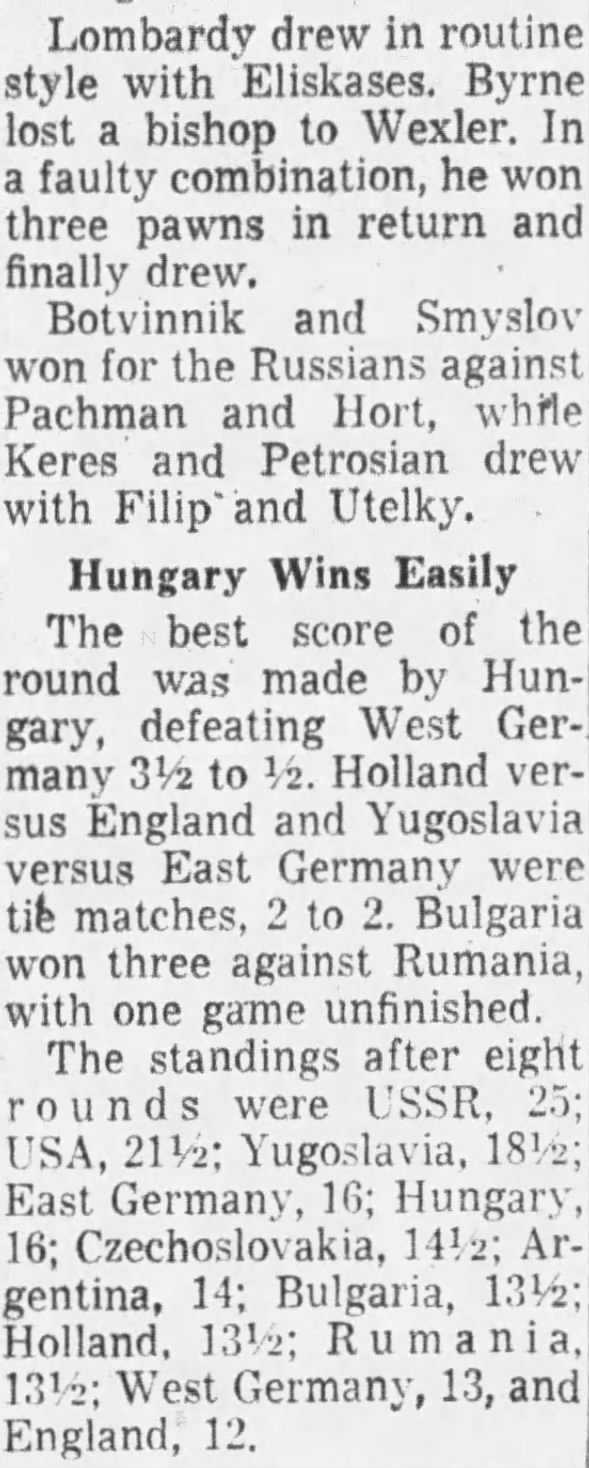< Prev Index Next >
 Chess by Isaac Kashdan 06 Nov 1960, Sun The Los Angeles Times (Los Angeles, California) Newspapers.com
Chess by Isaac Kashdan 06 Nov 1960, Sun The Los Angeles Times (Los Angeles, California) Newspapers.com
Leipzig Good Site For Chess Olympics
Arranging and conducting a tournament such as the Chess Olympics is a massive operation, requiring considerable advance preparation and plenty of money and manpower.
The East German and Leipzig officials went into action late in 1958, after the completion of the 13th Chess Olympics in Munich, West Germany. Based on discussions with players who were at Munich, they have clearly succeeded.
Excellent arrangements were made for comfort and convenience, both at the playing site and at the hotels. The players are quartered in the two leading hotels in Leipzig, the Astoria and the Park.
On arrival each player was given tickets for a value of 22 marks per day, sufficient for three good meals and an accompanying beer or two. He was also given 50 marks each 10 days for spending money, and a card entitling him to free transportation within the city. Considering that some 250 participants are involved, the cash outlay runs high.
The tournament is being held in a three-story building generally used for large receptions and exhibitions. There are 40 chess games in a large central area on each of two floors. The building is exceptionally well lighted, a prime requisite that is not always available in chess events.
Seats for spectators are spaced near each team, but in no way interfering with the players. For those who cannot get too near the games, the moves are reproduced on large wall boards. An official is assigned to each match to make sure that proper decorum is observed.
On coming to his board, each player is provided with a thermos of coffee or tea and a piece of pastry. More is available on request. Each team has its own cloak room, where pre-game conferences can be held and captains and reserve players can wait for developments.
A special press center is set up for the journalists, with wireless and long distance phone facilities available at all times. Typewriters and mimeograph machines are busy grinding out results. Bulletins containing the moves of all games played are available within 24 hours. All kinds of statistics are compiled and posted regularly.
Reporters are always around, looking for sidelights and interviewing players and officials. The tournament is regularly featured on local radio news programs. Comments by master players on feature games are also broadcast daily.
An unusually interesting feature at the tournament site is an exhibition of Chess Through the Ages. This is a series of displays in glass cases along the walls on both playing floors.
Many unusual and fascinating chess sets have been collected for the exhibition, as well as old books and manuscripts on the game. Many of the participating nations were given space for their own displays of pictures and unusual chess material, ancient and modern.
Even the sophisticated chess masters frequently take time out for another look at the many displays. These may vary from an Arabic chess problem composed in 1100 to a chess set based on electronic devices.
Games From Olympics
The following games were played in the preliminary rounds of the Chess Olympics.

 U.S. Defeats Argentina in Chess Match 06 Nov 1960, Sun The Los Angeles Times (Los Angeles, California) Newspapers.com
U.S. Defeats Argentina in Chess Match 06 Nov 1960, Sun The Los Angeles Times (Los Angeles, California) Newspapers.com
U.S. Defeats Argentina in Chess Match
By Isaac Kashdan, Times Chess Editor
Leipzig—The American team has defeated Argentina by 2½ to 1½ in the Chess Olympics here, consolidating its second place position.
The Russians, who are defending champions, improved their hold on first place by a 3-1 victory over Czechoslovakia.
The only winner for the Americans was Bisguier on the fourth board, who outplayed Foguelman to win two pawns and the game.
Fischer Loses Advantage
Bobby Fischer gained considerable advantage in the first session against Najdorf, but misplayed after the adjournment, allowing a draw ending.
Lombardy drew in routine style with Eliskases. Byrne lost a bishop to Wexler. In a faulty combination, he won three pawns in return and finally drew.
Botvinnik and Smyslov won for the Russians against Pachman and Hort, while Keres and Petrosian drew with Filip and Utelky.
Hungary Wins Easily
The best score of the round was made by Hungary, defeating West Germany 3½ to ½. Holland versus England and Yugoslavia versus East Germany were tie matches, 2 to 2. Bulgaria won three against Rumania, with one game unfinished.
The standings after eight rounds were USSR, 25; USA, 21½; Yugoslavia, 18½; East Germany, 16; Hungary, 16; Czechoslovakia, 14½; Argentina, 14; Bulgaria, 13½; Holland, 13½; Rumania, 13½; West Germany, 13, and England, 12.






















